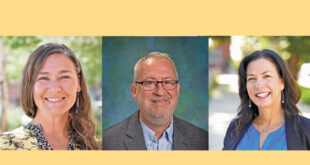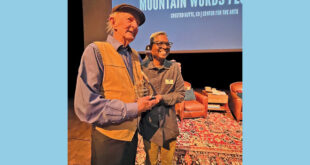By Dawne Belloise
Rob Weissbaum proudly displays a colorful tattoo of intense blues, greens and red-orange, a scaled koi fish twisting its way up his arm and metamorphosing into a fanged dragon at his shoulder. The body ink for him represents his survival of a traumatic skydiving accident that set him back physically, but never seemed to dampen his impermeably positive spirit. Today, Rob is Crested Butte’s Emergency Medical Services chief, a new position that evolved from the EMS coordinator.

Rob was born in Chicago but raised in Ann Arbor, Mich. His father worked for Edison Electric, and his mom was a chef by trade. Rob and his sister were allowed, in his own words, “to do everything as kids. Back then, Dad gave us free rein. Parents weren’t as protective as they are these days, but when the porch light came on, you better be home for dinner and homework.” They ate meals together as a family and grew up without a TV, which was conducive to spending a lot of time outdoors and doing other activities.
Rob says, “We were really involved in sports and extracurricular activities. I was a hockey player, and also played baseball. I’ve studied martial arts since I was six, when my mom got me into Tae Kwon Do.” Rob competed in the martial art, earning a 5th Dan Black Belt, of the eight it takes to qualify as Master.
He graduated from high school in 1999 and enrolled at Eastern Michigan University in Ypsilanti, where he thought that he wanted to be a marine biologist but, he laughs, “As I researched it more I realized I was looking at a life of struggle,” not only the studies but the career. “So I went with my backup—to be a firefighter.” He had taken all AP classes in high school so he became bored with the business classes he had enrolled in and felt, “It was time to focus on firefighting. As I started talking to people about it, everyone told me to get my EMT first, so I immediately signed up to take that program,” which was four months of intensive classes in Ann Arbor. He completed the course by the end of 2000.
“As I was finishing up those classes, I realized I didn’t like being told what to do, so I signed up for paramedic school, an accelerated program and a very intensive ten months.” He grins and explains, “I wanted to be the boss. In the field, you’re alone with your partner so you’re making decisions for the team. Most often you’re partnered with an EMT and a paramedic, and ultimately, you’re doing independent decision making.”
Rob was already working as an EMT for an ambulance service while he was attending the paramedic program. “It was a very stressful time, with hours of clinical time, riding ambulance, hospital, and clinical rotations in all the departments, from OBGYN to emergency room and operating room.”
As a new paramedic, Rob was working in Detroit, which he referred to as the “Gun and Knife Club,” and he says, “The majority of our calls were trauma and violence-related and we were extremely busy. It was a 24-hour shift, so we were on call 24 hours at the station. Back then, we were so busy that we rarely got to sleep.”
He spent six years in the strain of Detroit where the emotional and psychological effects of the job could make or break you in this field. “After the first year of seeing the amount of tragedy I saw, I realized that I could manage it for the rest of my life. I felt I had something I could offer to the community. My mentors, 20-plus year veterans of the job, guided me in the right direction and shaped my career.”
In 2002, Rob was working on getting his pro skydiving license and on July 12 was doing his 18th jump of the 20 needed to qualify. “It was my second jump of the day. My parachute had deployed fine, but as I’m coming down, I got a big gust of wind and ended up taking a hard turn, called a swoop turn. I was about 100 feet too low when I initiated that turn and realized I was going to crash. I prepped for the hard hit, and after I hit the ground and looked at my legs, both my feet were faced backwards and bones were sticking out of both legs. As a paramedic, I thought, these are the coolest fractures I’ve ever seen. The best part about it was that I was begging somebody to go grab a camera.” The breaks were right at the ankles and he was at risk of losing one leg but after 10 hours of surgery, his doctors were able to save both legs. He was in rehab for an entire year.
“My crew took care of me, making sure I had insurance coverage and support. I’m not skydiving anymore,” he confirms.
After six years in Detroit, Rob felt he wanted to do more. “I was getting burnt out on the busy-ness of working the city job and I wanted to progress further with medicine and advance my career.” While he was working as a paramedic, Rob began six months of firefighting training, becoming certified as a Firefighter 2 in 2003.
“I started working as a paid on-call firefighter paramedic for Woodhaven Fire Department, in Michigan. During my skydive accident, I was flown by helicopter to the University of Michigan hospital and during the flight I was thinking, this is what I want to do for my career, be a flight paramedic.”
He’s been certified as a Critical Care Paramedic for eight years now, with much of the training learned on the job after passing the test.
Rob packed up and left the Motor City of Detroit and all its nonstop trauma to take a job as a flight paramedic in Chandler, Ariz. in 2006. “I had never been there but I just picked up and left,” he says—in fact, he had never even been out west.
The job proved to be really busy, which he enjoyed. “We had two helicopters on our base in Yuma and averaged 300 flights per year.” He discovered that he loved Arizona and despite the constant pain in his ankles, he took up and enjoyed golf. He was also “big into motorcycles so I rode my motorcycles a ton. I was having the best time of my life being a paramedic.”
Then the company he was working for decided to open a base in Montrose. Rob puzzled, “Where the heck is that? I Googled Montrose and saw Telluride, Vail and Aspen, and thought, I can do that. But I had never even heard of Crested Butte, never even saw it on the map.”
Rob volunteered to take the position and move with his four-person team to start the Montrose Tri-State Careflight Base in June 2009. Four years later when the Crested Butte Fire Protection District posted a job for their first full-time paid firefighter medic position, Rob applied and was hired. His long-term goals of having stability, a pension, and health benefits convinced him to move as well as, he beams, “The community, it’s a cool town. I’ve been in a lot of different places and this place just continues to amaze me. It’s awesome. I’m super proud of my staff and volunteers for the level of care we provide to our community. Compared to similar communities, we have progressed beyond the standard of EMS. My staff is now Critical Care Certified and we have very progressive protocols. We do a lot of research and stay in touch with current practices to assure we are providing the highest, most modern level of care that we can. The recent November vote for a mill levy increase for CBFPD allowed us to hire two more full-time firefighter paramedics to assure 24/7 and 365 days a year of Advanced Life Support (ALS) coverage. We service the entire north end of the valley, which is approximately 220 square miles.”
Rob feels that he’s always been a people person. “I’ve always considered myself to be very caring. I grew up with a Zen Buddhist dad and a lot of that rubbed off on me. I feel that I practice that lifestyle and way of thinking. The discipline embedded into me in Tae Kwan Do played a huge role in my Buddhism.”
Rob’s entire life seems to have been focused around his career of service to others, but he admittedly also has a healthy relationship with fun. “I work to live, not live to work and heck yeah, I ski with these ankles. I shred,” He laughs, “I like to consider myself pretty tough.”
Summers find Rob hiking, mountain biking and fly fishing, the typical mountain lifestyle. “I potentially see myself here for the rest of my life, at least the rest of my career. I’m in a really good spot here, I’m the EMS chief. I’m the boss.” He grins, and there’s not hint of ego in his statement whatsoever. He’s just happy to be part of a community that he can serve alongside his fine and experienced staff. “We don’t do this job for recognition—we do it because we care.”
 The Crested Butte News Serving the Gunnison Valley since 1999
The Crested Butte News Serving the Gunnison Valley since 1999




